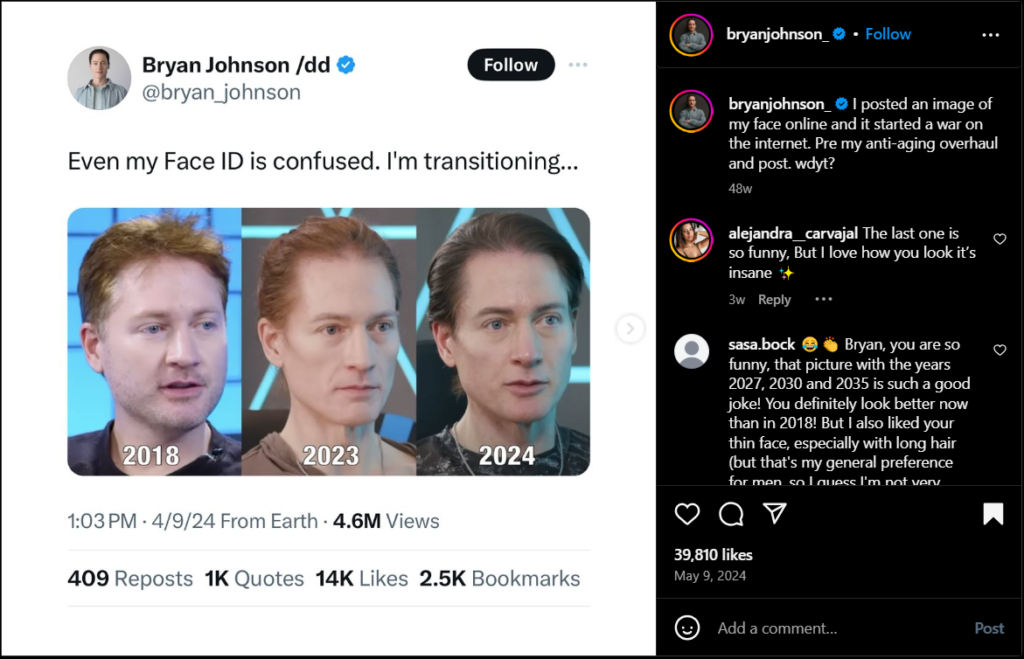Can the richest people in the world live forever? The idea of living forever has always caught the attention of billionaires. Now, they are spending a lot on research and new technologies to live longer and longer.

The dream of living forever is not new. But today, billionaires like Bryan Johnson are leading a big push. They are putting millions into new science and health tech.
This article looks into the world of immortality-seeking billionaires. We’ll explore why they want to live forever, how they plan to do it, and what it might mean for us all.
Key Takeaways
- Billionaires are investing heavily in longevity research and technologies.
- The quest for immortality involves cutting-edge science and innovative health tech.
- Bryan Johnson is a prominent figure in the immortality movement.
- The pursuit of eternal life raises significant ethical and societal questions.
- The outcomes of these endeavors could have far-reaching implications.
The Ancient Dream of Eternal Life
For ages, people have dreamed of living forever. This dream has sparked endless curiosity and creativity. It has pushed humans to explore and innovate.
Historical Figures Who Sought Immortality
Many famous people have wanted to live forever. Qin Shi Huang and Sima Pi are two examples.
Qin Shi Huang’s Infamous Quest
Qin Shi Huang united China’s warring states. He was determined to live forever. He used alchemists and searched for the elixir of life.
His efforts were huge, like building the Terracotta Army. He went to great lengths to cheat death.
Sima Pi’s Longevity Pursuits
Sima Pi, a Jin dynasty emperor, also wanted to live longer. He tried elixirs and special diets to stay young.
Early Scientific Attempts at Life Extension
At first, life extension was about alchemy and magic. But as we learned more about our bodies, new ways to live longer emerged. Early medical research started, paving the way for today’s studies on aging.
Modern Wealth and the Pursuit of Longevity
Billionaires are leading the charge in the quest for longer lives. They’re spending millions on research and tech to extend the human lifespan. This push is fueled by their wealth, tech savvy, and the dream of beating human biology’s limits.
Why Billionaires Are Obsessed With Living Longer
Big names like Bryan Johnson and Ray Kurzweil are diving deep into longevity research. They believe tech and medicine can help them live forever. Their goal is to beat death itself.
But it’s not just about living longer. It’s about living well, too. Billionaires see a chance to keep growing their wealth and knowledge. This way, they can leave a lasting mark on the world.
The Economics of Anti-Aging Research
Anti-aging research is getting a big boost from billionaires. Companies like Bryan Johnson’s Kernel are leading the charge. They’re working on tech to boost brainpower and maybe even extend life.
Return on Investment in Longevity
Investing in longevity research can pay off big time. It’s not just about making money. It’s about making a real difference in people’s lives. As tech improves, so do the chances for major breakthroughs in health and longevity.
Market Size and Growth Projections
The anti-aging market is set to explode, thanks to more people wanting to live longer. Reports say the global market will hit huge numbers soon. This growth is driven by new research and more investment from the rich and venture capitalists.

Bryan Johnson: The Blueprint for Immortality

Bryan Johnson is a leader who is searching for a longer life. He’s known for his strict routine and new ideas.
Who Is Bryan Johnson?
Bryan Johnson is a tech entrepreneur with a big net worth. He made his money through his tech companies.
Bryan Johnson’s Net Worth and Business Background
Johnson’s net worth is about $1.5 billion. He earned it through the Braintree and OS Fund. His smart business moves help fund his life extension goals.
Bryan Johnson’s Companies and Ventures
Johnson focuses on tech and innovation. His latest project is Kernel, aimed at extending life.
The Blueprint Protocol Explained
The Blueprint protocol is Johnson’s plan for better health and a longer life. “The goal is to reverse biological aging by implementing a strict protocol that includes diet, exercise, and advanced medical interventions.” It uses the latest aging research.
Johnson’s Daily Regimen and Diet
Johnson’s daily life is very structured. He eats a specific diet and exercises regularly. Johnson follows the vegan diet, except for collagen peptides. It usually consumes 2,250 calories a day, 130 grams of protein, 206 grams of carbohydrates, and 101 grams of fat. Johnson finishes it with another 34 pills and takes his morning. His diet is carefully planned to boost his health.
Bryan Johnson’s Before and After Transformation
Johnson’s transformation is clear in his before and after photos. His hard work has greatly improved his health and looks.

Bryan Johnson’s Skin Care Routine
Johnson also focuses on his skin care. He uses various treatments and products to keep his skin healthy. His routine includes cleansing, moisturizing, and protecting his skin.
“The key to longevity is not just living longer, but living better.”
Medical Perspectives on Johnson’s Methods
Dr. Nir Barzilai and other experts have raised several concerns about Bryan Johnson’s longevity plan. Johnson’s blueprint for immortality has sparked a lot of debate in the medical field.
Dr. Nir Barzilai’s Concerns
Dr. Nir Barzilai, a well-known longevity expert, has shared his worries about Johnson’s methods. He points out two main issues.
The “Sick” Appearance Controversy
One concern is Johnson’s appearance. Critics say his strict following of the blueprint has made him look unhealthy.
Scientific Critique of Blueprint
Dr. Barzilai also questions the science behind Johnson’s blueprint. He doubts the safety and effectiveness of some of the methods used.
The Controversy Among Longevity Experts
The longevity community is split on Johnson’s approach. Some experts believe it could be beneficial, while others, like Dr. Barzilai, have serious doubts.
| Aspect | Supporters’ View | Critics’ View |
| Scientific Basis | Groundbreaking research | Lacks substantial evidence |
| Safety | Closely monitored | Potential health risks |
| Efficacy | Promising initial results | Long-term effects unknown |
The debate over Johnson’s methods shows the complexity and challenges in the quest for longevity. As research goes on, it’s unclear if his approach will achieve the desired results.
Michael Jackson’s Longevity Ambitions

Jackson’s dream of living up to 150 years is fascinating. His interest in living longer was deep and influenced his life greatly.
The Legendary Pop Star’s Dream of Living to 150
Michael Jackson wanted to live to be 150. He thought medicine and technology could make it possible. His belief was shaped by his study of longevity experts and scientists.
Michael Jackson’s Unusual Health and Hygiene Practices
Jackson’s health and hygiene habits were unique. He followed a strict diet, exercise, and hygiene routine. His daily life was very structured, showing his commitment to living longer.
Michael Jackson’s Daily Habits
Jackson had a disciplined daily routine. He ate a strict diet and exercised regularly. He also drank a lot of water to stay hydrated.
Michael Jackson’s Lifestyle Choices
His lifestyle choices were aimed at living longer. He changed his living environment to avoid health risks. This was part of his effort to live a longer life.
The Role of Doctors in Jackson’s Life
Doctors played a big role in Jackson’s life. He sought advice from many medical professionals. He was especially interested in those exploring new ways to extend life.
| Aspect | Description |
| Diet | Strict regimen with emphasis on hydration |
| Exercise | Regular physical activity |
| Hygiene Practices | Frequent hand washing and cleanliness |
Ray Kurzweil and Technological Immortality
Futurist Ray Kurzweil has spent his career studying how tech can make us live longer. He thinks tech will advance so fast that we’ll live forever.
Supplement Regimen
Kurzweil takes over 200 supplements every day. He believes this helps him stay healthy and young.
The Singularity Theory
Kurzweil’s Singularity theory says tech will change human life a lot. He thinks we might live forever by becoming part of machines.
Google’s Longevity Research Investments
Google is putting a lot of money into making us live longer. They’re using Calico Labs and Verily Life Sciences for this.
Calico Labs and Anti-Aging Research
Calico Labs is all about aging research. They want to find ways to slow down aging and live longer.
Verily Life Sciences Initiatives
Verily Life Sciences is working on health and longevity. They use tech to prevent and treat diseases, aiming to extend our lifespan.
Some ways to achieve immortality through tech include:
- Advancements in AI and machine learning
- Nanotechnology for health repair
- Biotechnology for disease prevention
Elizabeth Parrish: The Human Guinea Pig
Elizabeth Parrish, CEO of BioViva, leads in gene therapy to extend human life. She’s a key figure in longevity research, pushing for gene therapy and trying it herself. This has sparked both interest and debate.
BioViva and Gene Therapy Experiments
BioViva, under Parrish, explores gene therapy with two main methods. They focus on telomere lengthening and senolytic therapy. Telomere lengthening aims to extend chromosome caps, reversing aging. Senolytic therapy targets and removes cells that cause aging and diseases.
Results and Controversies
Parrish’s gene therapy seems to show positive results, with signs of younger biological age. Yet, many scientists doubt these findings. They point out the need for solid, peer-reviewed evidence and worry about safety and effectiveness.
Scientific Community Reactions
The scientific world has mixed feelings about Parrish’s work. Some see gene therapy’s potential for longer life. Others question the lack of controlled studies and the risks involved.
Ethical Concerns of Self-Experimentation
Self-experimentation, like Parrish’s, raises ethical questions. It could harm others who try it without proper care. This situation emphasizes the need for strict rules and more research on gene therapy safety and effectiveness.[Source: 1,2]
| Treatment | Purpose | Status |
| Telomere Lengthening | To elongate telomeres, potentially reversing cellular aging | Experimental |
| Senolytic Therapy | To eliminate senescent cells contributing to aging and age-related diseases | Experimental |
Alexander Bogdanov’s Blood Transfusion Experiments
Alexander Bogdanov was a Soviet scientist who worked on blood transfusion in the early 1900s. He believed that blood transfusions could lead to rejuvenation and even immortality.

The Soviet Scientist’s Theories
Bogdanov thought that blood carried vital information and properties. He believed these could be transferred from one person to another. He thought this could stop or reverse aging.
He wanted to create a “physiological collectivism.” This meant exchanging blood between people to achieve a kind of unity. He hoped this would lead to longer, healthier lives.
His Tragic End and Legacy
Bogdanov’s experiments sadly ended in his death. In 1928, he gave himself a blood transfusion from a student with malaria. The student had a different blood type, which was fatal for Bogdanov.
Even though it was a tragic end, Bogdanov’s work helped start research in blood transfusion. It showed the potential of blood transfusions, even if it was not done safely.
Impact on Modern Blood Research
Bogdanov’s work, though flawed, helped us understand blood transfusions better. Today, we have safer and more effective ways to transfuse blood.
- Advancements in blood typing and compatibility testing
- Improved understanding of blood-borne pathogens
- Development of safer transfusion protocols
Lessons for Contemporary Longevity Seekers
Today’s researchers can learn from Bogdanov’s efforts to extend life. His story teaches us the value of careful science and caution. It shows the risks of rushing into new ideas without proper research.
People Who Want to Live Forever: Common Strategies and Approaches
Many people are trying different ways to live longer. They follow special diets, exercise, and take certain medicines. These methods aim to help them age healthily and live longer.
Caloric Restriction and Fasting
Some people cut down on calories or fast to live longer. This can help reduce damage to cells and improve how the body cleans itself. By eating fewer calories, they might slow down aging.
Supplement Stacks and Pharmaceuticals
Others use supplements and medicines to live longer. They take vitamins, minerals, and other substances thought to slow aging. But, experts often disagree on how well these work.
“The right diet can significantly impact our lifespan and healthspan. Caloric restriction, for instance, has been shown to have numerous health benefits.”
Exercise and Physical Activity Guidelines
Exercise is key for those wanting to live longer. The 2018 Physical Activity Guidelines suggest doing at least 150 minutes of moderate or 75 minutes of vigorous activity weekly.
Moderate vs. Vigorous Exercise Benefits
Moderate activities, like brisk walking, boost heart health. Vigorous activities, like running, improve fitness and might increase life span.
Exceeding Recommended Exercise Levels
Doing more exercise than recommended can bring extra benefits. It can lower the risk of chronic diseases and improve mental health.
| Exercise Type | Benefits | Examples |
| Moderate Exercise | Improved cardiovascular health, weight management | Brisk walking, cycling |
| Vigorous Exercise | Enhanced fitness, increased lifespan | Running, swimming laps |
Cryonics: Freezing the Way to the Future
Cryonics is a way to preserve the human body at very low temperatures. It’s seen as a step towards immortality. The body is cooled to stop all metabolic processes, hoping to revive it when technology improves.
How Cryopreservation Works
The cryopreservation process starts with medications to stop ice crystal formation. The body is then cooled slowly to avoid damage. The aim is to keep the brain and vital organs in a state for future revival.
Advanced equipment and techniques are needed to reach the needed temperatures without harming cells. Cryoprotectants prevent ice, and the body is cooled to 196°C, the temperature of liquid nitrogen.
Billionaires Who’ve Signed Up
Many famous people have chosen cryopreservation, hoping for revival when technology catches up. Robert Ettinger, the founder of the Cryonics Institute, was one of the first. Others include Ted Williams, the baseball legend, and James Bedford, a psychologist.
Cost and Accessibility Issues
Cryopreservation is very expensive, costing between $28,000 and over $100,000. This makes it hard for most people to access, as it’s mainly for the wealthy.
Scientific Viability of Revival
Scientists are unsure if cryopreserved people can be revived. Revival would need big advances in medical tech, like fixing freezing damage and starting cells again. While some think it’s possible, others doubt it due to the damage from freezing.
The Silicon Valley Approach to Death
Death is getting a new look in Silicon Valley. Tech giants are pouring money into research on living longer. This tech hotspot is leading the charge toward eternal life.
Tech Moguls Funding Longevity Research
Big names in tech are backing research on living longer. For example, Peter Thiel has invested in Unity Biotechnology. They work on treatments to fight aging.
Google’s Calico Life Sciences is also in the game. They aim to understand and control aging.
Notable Startups and Their Promises
New startups are popping up with fresh ideas on longevity. Some of these include:
- Unity Biotechnology: Developing senolytic therapies.
- Cerberus Biotechnology: Focused on rejuvenation therapies.
- Altos Labs: Conducting cellular reprogramming research.
Breakthrough Anti-Aging Technologies
New discoveries are changing the game. Senolytic therapy and cellular reprogramming are leading the way. They aim to make our cells young again and extend our lives.
Investment Trends in Longevity Tech
More money is flowing into longevity tech. Venture capitalists and tech leaders are betting on startups. They believe in the power of anti-aging tech to improve our healthspan.
| Company | Focus Area | Notable Investors |
| Unity Biotechnology | Senolytic therapies | Peter Thiel |
| Calico Life Sciences | Aging biology | Google, Arthur Levinson |
| Altos Labs | Cellular reprogramming | Sergey Brin, Jeff Bezos |
The Science Behind Extreme Longevity Claims
Understanding aging is key to judging claims of extreme longevity. New research has shed light on the biological processes involved.
Current Research on Aging
Aging research has seen big strides. It focuses on the aging process’s underlying mechanisms. Telomeres and epigenetic clocks are two main areas of study.
The Role of Telomeres and Cellular Aging
Telomeres protect chromosome ends and shorten with age. Keeping telomeres long may slow or prevent age-related diseases. Telomere length is seen as a sign of biological aging.
Epigenetic Clocks and Biological Age
Epigenetic clocks measure a cell’s or tissue’s biological age. They offer insights into aging beyond just age. These clocks rely on DNA methylation patterns.
Promising Breakthroughs
Several breakthroughs have been made in aging research. Senolytics target senescent cells, which contribute to aging. Other promising areas include stem cell therapy and genetic editing.
| Research Area | Description | Potential Impact |
| Senolytics | Targeting senescent cells | Reducing age-related diseases |
| Stem Cell Therapy | Repairing damaged tissues | Improving tissue function |
| Genetic Editing | Modifying genes related to aging | Potentially increasing lifespan |
Scientific Skepticism
Despite progress, many scientists doubt extreme longevity claims. They say aging’s complexity can’t be fully understood by current research.

Ethical Considerations of Immortality Pursuits
The quest for eternal life is not just a scientific issue but also an ethical one. As billionaires and scientists explore ways to extend the human lifespan indefinitely, several ethical concerns come to the forefront.
One of the primary ethical considerations is social inequality. The pursuit of immortality could exacerbate existing disparities in society.
Social Inequality Concerns
Immortality or significant life extension could lead to a scenario where those who have access to such technologies live longer, healthier lives, while those who do not are left behind. This raises concerns about the widening gap between different socio-economic groups.
Access to Life-Extension Technologies
The cost and availability of life-extension technologies will play a crucial role in determining who can benefit from them. If these technologies are expensive and only accessible to a few, it could lead to a new form of social stratification.
The “Immortal Elite” Scenario
The possibility of an “immortal elite” raises questions about the societal implications of having a group of individuals who are virtually ageless and potentially accumulating wealth and power over centuries.
Environmental and Resource Implications
Another critical ethical consideration is the potential environmental impact of significantly extended lifespans. More people living longer lives could lead to increased consumption of resources, potentially straining the planet’s ecosystems.
Furthermore, the environmental implications of a growing population, even if the growth rate slows, could be significant. This includes pressure on food supplies, energy resources, and the overall sustainability of human civilization.
Psychological Aspects of Fearing Death
The ultra-wealthy often have a complex relationship with mortality. They fear death deeply. This fear comes from various psychological factors.
Why the Ultra-Wealthy Fear Mortality
The ultra-wealthy fear death because they lose control. They can no longer influence the world. Their wealth and power make death seem even scarier.
The Psychology of Control and Legacy
The desire for control and legacy is key. The ultra-wealthy use their wealth to try to live beyond death. They do this through philanthropy, business legacies, and more.
Death Anxiety Among the Privileged
Death anxiety is strong among the ultra-wealthy. They are very aware of mortality. They fear losing their privileged status.
Alternative Approaches to Mortality Acceptance
Some ultra-wealthy individuals look for new ways to accept death. They focus on their legacy’s impact or finding meaning in their life.
The Future of Human Longevity
The search for longer life is pushing innovation in medicine and technology. Looking ahead, we must grasp the potential advancements and their effects.
Realistic Expectations vs. Hype
The longevity field is full of real breakthroughs and overhyped claims. It’s key to tell the difference to know what’s coming.
Potential Breakthroughs in the Next Decade
Senolytics, gene editing, and regenerative medicine could greatly extend our lives soon. Senolytic therapy targets aging cells.
The “Don’t Die” Movement
The “Don’t Die” movement, led by some longevity fans, stresses the value of not giving up on life. It urges people to act to live longer.
Potential Societal Impacts
Longer lives could deeply affect society, like changing workforces and pension systems. Societal adaptation is vital for handling these shifts well.
As longevity research moves forward, we must think about the big picture. We need to get ready for a future where we might live longer and healthier.
Conclusion: The Ultimate Legacy of Immortality Seekers
For centuries, humans have dreamed of living forever. Billionaires like Bryan Johnson and celebrities like Michael Jackson have pushed this dream to new levels. They all aim to beat death.
People have tried to live forever in many ways. Some try caloric restriction or supplements. Others look into cryonics or gene therapy. But not all methods are proven or accepted.
The results of these efforts could change everything. If they work, we might learn more about aging and live longer. This could change how we live and the world around us.
In the end, the legacy of those seeking immortality will depend on their success. It will also depend on their impact on science, ethics, and humanity.
FAQ
Who is Bryan Johnson and what is his net worth?
Bryan Johnson is a successful entrepreneur and businessman. He has made a lot of money through his ventures. His net worth comes from his companies and investments.
What is Bryan Johnson’s Blueprint protocol?
Bryan Johnson created the Blueprint protocol for longevity and health. It includes a strict diet and exercise routine. The goal is to live longer.
How does Bryan Johnson’s diet contribute to his longevity goals?
Bryan Johnson follows a special diet as part of his Blueprint protocol. This diet is designed to support his goal of living longer. It’s carefully planned for health and longevity.
What are some of the controversies surrounding Bryan Johnson’s methods?
Bryan Johnson’s longevity methods have sparked controversy. Some experts question the science and risks behind his approach.
Who is Ray Kurzweil and what is his stance on immortality?
Ray Kurzweil is a futurist and inventor. He believes technology will help achieve immortality. He supports using technology and supplements to live longer.
What is cryonics and why do some billionaires opt for it?
Cryonics is freezing the body or brain in hopes of future revival. Some billionaires see it as a way to live forever.
What are some common strategies used by people seeking longevity?
People seeking to live longer use various strategies. These include caloric restriction, fasting, supplements, and specific exercises. They aim to extend their lifespan.
What is the “Don’t Die” movement?
The “Don’t Die” movement is about fighting aging and death. It focuses on technology and biomedical research to understand and combat aging.
How does Michael Jackson’s approach to health and hygiene relate to his ambitions for longevity?
Michael Jackson had unique health and hygiene practices. He wanted to live longer and used various health regimens and lifestyle choices to achieve this goal.
What are the ethical concerns surrounding the pursuit of immortality?
Pursuing immortality raises ethical concerns. Issues include social inequality, access to life-extension technologies, and environmental and resource impacts of longer lifespans.
